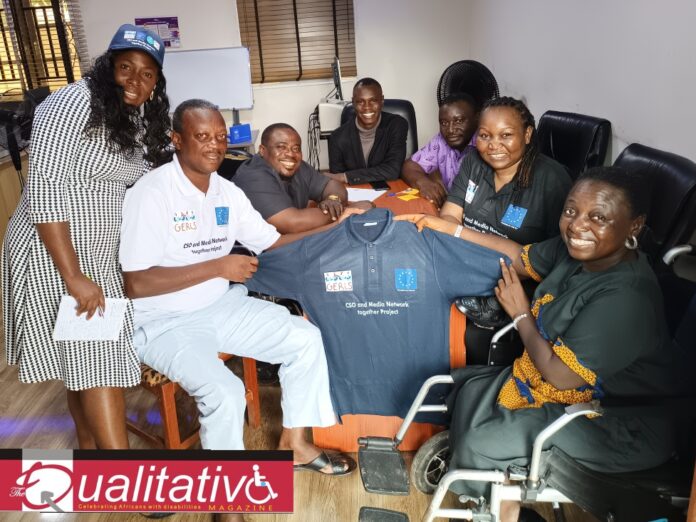A team of advocates have expressed enthusiasm towards forming a coalition of media practitioners to create more awareness on issues affecting women with disabilities in Nigeria.
The team made this commitment during a visit to Network for Disabled Women (NDW) recently in Abuja as part of the activities of a microproject under the GERIS project being funded by the European Union and implemented by Particip through Apolmida Haruna Tsammani of Haly Hope Foundation and Zubairu Babajide Atta of Media Advocates for Peace.
Zubairu Atta in his speech expressed concern over the low media reportage of issues affecting women with disabilities. He said that issues of women with disabilities have not featured in the media space the way it should be going by the magnitude of the challenges facing women with disabilities in Nigeria.
He suggested that the members of the advocacy team who are media practitioners should lead a coalition of media practitioners who will champion conversation around issues affecting women with disabilities in Nigeria.
He also said that the coalition will take advantage of different media platform to stage conversation around the issues.
The media should report, develop content on issues affecting women with disabilities with solutions to the challenges to guide policy makers.
The media can organize media roundtable or hangouts on this conversations, in order to understand the numerous challenges faced by women with disabilities and create awareness strategy to educate the public more about the issues.
A member of the advocacy team and the Publisher of The Qualitative Magazine (TQM), Agbo Chris Obiora in his submission said that a lot have been happening among Organizations of Persons with disabilities (OPDs ) on issues affecting women and girls with disabilities and the media have been reporting these activities but however, these reports are not enough because they end up at news desk which have not created more light on the issues for members of the public to thoroughly understand the challenges faced by women with disabilities.
He promised to create a column for women with disabilities on his media outfit’s website to promote the rights of women with disabilities in response to the request from Lois Auta, the President of NDW during her remark.
Earlier, Apolmida Haruna Tsammani said that it is a three-year project which started in 2020 to end this year 2022 and it known as Global Exchange on Religion in Society (GERIS). It is a CSO and Media networking project with the target of bringing everybody together irrespective of their divide to address Sexual and Reproductive Health Rights of Women and Girls with Disabilities.
She said that through the project, they would be working with organizations like Dorothy Njemanze Foundation to develop a referral Helpline and seek NDW’s support towards mobilizing women with disabilities to take advantage of the initiative.
Lois Auta, the President, Network of Disabled Women (NDW) in her response said that there is a role, women with disabilities should play when it comes to SRHR and GBV, women with disabilities should do more in the area of reporting any act of violence or discrimination against them. It will aid the intervention effort of CSO and MDAs on their issues because inability of women with disabilities to come forward and report; there has been lack of data on violence and discrimination against women with disabilities.
She suggested that organization should seek for funding to carry out survey towards generating data on violence against women with disabilities.
“It is a big issue because without data, we can plan well for women with disabilities” she added.
She also said that women with disabilities should take space politically citing article 29 and 30 of United Nations Convention On Rights of Persons with disabilities (UNCRPD) because it is only one way the issue can be brought to the foreburner and also taken seriously.
“Recently, I was able to break through the APC women wing and now, women with disabilities have been recognized in the party”.


